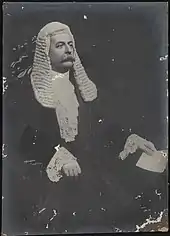Carty Salmon
Charles Carty Salmon (27 July 1860 – 15 September 1917) was an Australian politician who served as the second Speaker of the Australian House of Representatives, in office from 1909 to 1910. A doctor by profession, he began his political career in the Victorian Legislative Assembly before winning election to the House of Representatives at the inaugural 1901 federal election. He represented the Protectionist Party initially and then the Liberal Party, serving as Speaker for the duration of the Third Deakin Ministry. Salmon lost his seat in 1913, but returned to the House at a by-election in 1915. He died in office two years later.
Dr Carty Salmon | |
|---|---|
.jpg.webp) | |
| 2nd Speaker of the Australian House of Representatives | |
| In office 23 July 1909 – 30 June 1910 | |
| Preceded by | Frederick Holder |
| Succeeded by | Charles McDonald |
| Member of the Australian Parliament for Grampians | |
| In office 20 February 1915 – 15 September 1917 | |
| Preceded by | Edward Jolley |
| Succeeded by | Edmund Jowett |
| Member of the Australian Parliament for Laanecoorie | |
| In office 29 March 1901 – 23 April 1913 | |
| Preceded by | New seat |
| Succeeded by | Division abolished |
| Personal details | |
| Born | 27 July 1860 Amherst, Victoria |
| Died | 15 September 1917 (aged 57) South Yarra, Victoria |
| Nationality | Australian |
| Political party | Protectionist (1901–09) Liberal (1909–17) Nationalist (1917) |
| Spouse(s) | Nancy Anne Harris |
| Alma mater | University of Melbourne |
| Profession | Doctor |
| Signature | |
Early life
Salmon was born at Amherst, Victoria on 27 July 1860 to English-born parents: storekeeper Frederick Browne Salmon and Susannah Carty, née Arnell. He attended Scotch College, Melbourne and, after a brief time with his uncle's tobacco company, returned to his father's grazing property. In 1886, he entered the University of Melbourne, studying medicine, obtaining Scottish qualifications and subsequently practicing as a doctor.
Colonial politics
As honorary surgeon for the South Yarra Relief Committee, Salmon met Alfred Deakin and formed a lifelong friendship. He won an 1893 by-election for the Victorian Legislative Assembly seat of Talbot and Avoca as an independent, and became identified as a political liberal. He was a minister without portfolio, and subsequently minister for public instruction and commissioner for trade and customs, in Allan McLean's government from 1899–1900. He married Nancy Anne Harris in Sydney on 3 October 1900.
Federal politics

In 1901, Salmon won election to the new Australian House of Representatives as the Protectionist member for Laanecoorie, holding the seat until its abolition at the 1913 election. He was known for his support of the White Australia policy, a strong national defence (not including conscription), and the policy of New Protection. He served as chairman of committees from 1904 to 1905.[1]
In 1909, when the Protectionists amalgamated with the Anti-Socialists, Salmon became a member of the resulting "Fusion" Liberal Party. He was known as "an undistinguished but loyal personal follower" of Alfred Deakin, who began his third term as prime minister on 2 June. On 23 July, the incumbent speaker Sir Frederick Holder suffered a fatal cerebral haemorrhage while in the chamber. Salmon was elected as his successor on the same day, defeating Philip Fysh and Agar Wynne with the aid of Deakin's personal support.[2]
Salmon's term as Speaker lasted less than a year, as the Labor Party won the 1910 federal election and elected one of its own members to the position, Charles McDonald. This remained the shortest tenure for a Speaker until Ian Sinclair's term of 180 days in 1998. Salmon attempted to transfer to the Senate in 1913 after his seat's abolition, but was defeated; he also declined preselection for the safe seat of Balaclava. In 1915, however, he won the seat of Grampians from Labor in a by-election and joined the Nationalist Party upon its formation in 1916.
Salmon was a freemason and from 1914 was the grand master of the Grand Lodge of Victoria. He was also a lieutenant-colonel in the Australian Army Medical Corps and commanded a base hospital in Melbourne in 1914. He died on 15 September 1917 at his home in South Yarra and was buried with Masonic rites and full military honours. His eulogy was delivered by Lowther Clarke, Archbishop of Melbourne, and both Prime Minister Billy Hughes and Leader of the Opposition Matthew Charlton attended his funeral.
References
- "Appendix 3—Deputy Speakers". House of Representatives Practice (7th ed.). Parliament of Australia. Retrieved 15 February 2020.
- Souter, Gavin (1988). Acts of Parliament: A Narrative History of the Senate and House of Representatives. Melbourne University Press. p. 115.
- Hancock, I.R. (1988). "Salmon, Charles Carty (1860–1917)". Australian Dictionary of Biography. Melbourne University Press. ISSN 1833-7538. Retrieved 29 March 2008 – via National Centre of Biography, Australian National University.
| Parliament of Australia | ||
|---|---|---|
| Preceded by Frederick Holder |
Speaker of the Australian House of Representatives 1909–1910 |
Succeeded by Charles McDonald |
| Preceded by new seat |
Member for Laanecoorie 1901–1913 |
Succeeded by seat abolished |
| Preceded by Edward Jolley |
Member for Grampians 1915–1917 |
Succeeded by Edmund Jowett |
| Masonic offices | ||
| Preceded by Reverend Albert Holden |
Grand Master of the United Grand Lodge of Victoria 1914-1918 |
Succeeded by Fredrick Hickford |